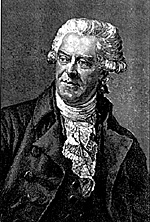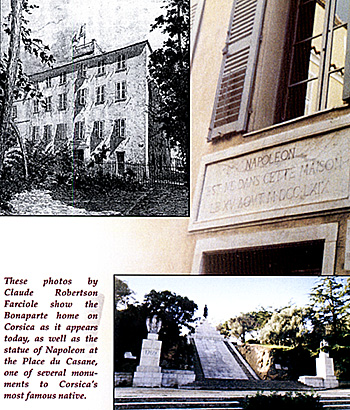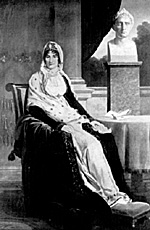
Born on the rugged and beautiful Mediterranean island of Corsica, in a time of revolution and strife, Napoleone Buonaparte, the second son of Carlo and Letizia, came into the world on 15 August 1769, a Frenchman by law but Corsican by all else.
He was born in Ajaccio without difficulty on the Day of the Feast of the Assumption, after his mother had attended Mass. Napoleon's father was a member of the modest Corsican nobility and a close confidant of the famous patriot Pasquale Paoli (at right). A hero to many future revolutionaries, Paoli succeeded not only in securing practical independence for Corsica from Genoa, but also, in 1764, of producing a liberal constitution that predated both the American and French versions by several years. After heroic resistance in the hills, Paoli and his followers, including Letizia and the unborn Napoleon, were unable to resist the sizable French invasions after Genoa sold the island to Louis XV. Accepting defeat, Paoli went into exile in England. Carlo, a young father, did not accompany his hero, instead choosing to practice law, raise his family, and ultimately cooperate with the new French regime.
 Existing in an untamed and impoverished land, Corsicans themselves were characterized by great superstition and frequent violence. Here the code of the vendetta traditionally reigned in place of a system of imposed foreign laws, and matters of honor and justice were frequently resolved with the stiletto.
Existing in an untamed and impoverished land, Corsicans themselves were characterized by great superstition and frequent violence. Here the code of the vendetta traditionally reigned in place of a system of imposed foreign laws, and matters of honor and justice were frequently resolved with the stiletto.
At right: Photos by Claude Robinson show the Bonaparte home and statue of Napoleon at Palce du Casane.
Feuds lasted for generations, an inflated sense of honor prevailed as well as a strong clannishness, and deep-rooted hatreds would spark endless cycles of retribution. The folklore of the island reflected its tragic heritage -- ghost stories and plaintive poetry were filled with dark omens and a strong sense of fatalism. The inescapability of destiny marked a prevalent Corsican theme, one that surely made a strong and lasting impression upon the young Buonaparte.
Letizia Buonaparte was by all accounts a striking dark-haired beauty. The task of bearing and raising eight children (losing two more who died in childbirth) did not diminish her loveliness. Among those who fell under her spell were both Paoli, and later, the French Governor of Corsica, Count Louis Charles Rene de Marbeuf. Letizia was a strong and excellent mother. Napoleon would say of her that she was "tender and strict" and he considered her a mother "without equal." Freudians often make something of the fact that Napoleon had a wet nurse, while his older brother first-born Joseph did not. After age two, Napoleon became increasingly clever and aggressive, and he often picked upon and dominated Joseph, competing for Letizia's attention.
 At the remarkably young age of nine, Napoleon was sent to France for schooling, thanks to their benefactor Marbeuf, who arranged for Joseph to go to a seminary school at Aix and Napoleon to military school in Brienne, both courtesy of scholarships set aside for impoverished French nobility.
At the remarkably young age of nine, Napoleon was sent to France for schooling, thanks to their benefactor Marbeuf, who arranged for Joseph to go to a seminary school at Aix and Napoleon to military school in Brienne, both courtesy of scholarships set aside for impoverished French nobility.
In what undoubtedly must have been a very trying moment, Letizia (at right) whispered only one word into her young son's ear -- "Courage" -- as she bid him a dockside farewell on 15 December 1778 when he left Corsica for France with his father, brother Joseph, and an uncle. He would see her only once in the next eight years.
More Napoleon: Introductory Guide
-
Introduction
Prejudice and Pride
Napoleon in Military School
The Young Artillerist's Double Life
Revolution & Opportunity
Women's Fashion During the Revolution
The Siege of Toulon
Napoleon & Josephine
Women's Fashion during the Directory
Fame & Glory: Italy
Fame & Glory: Egypt
Saviour or Usurper
Battle of Marengo
Civil Achievments
Enlightened Despot or Tyrant
Napoleon's Siblings
The Dawn of Gastronomy
Haydn and Beethoven
Women's Fashion during the Empire
Napoleon's Other Women
The Mashalate and Imperial Eagle
History's Greatest General?
Back to Table of Contents -- Napoleon #17
Back to Napoleon List of Issues
Back to MagWeb Master Magazine List
© Copyright 2001 by Napoleon LLC.
This article appears in MagWeb (Magazine Web) on the Internet World Wide Web.
The full text and graphics from other military history magazines and gaming magazines are available at http://www.magweb.com
Order Napoleon magazine direct